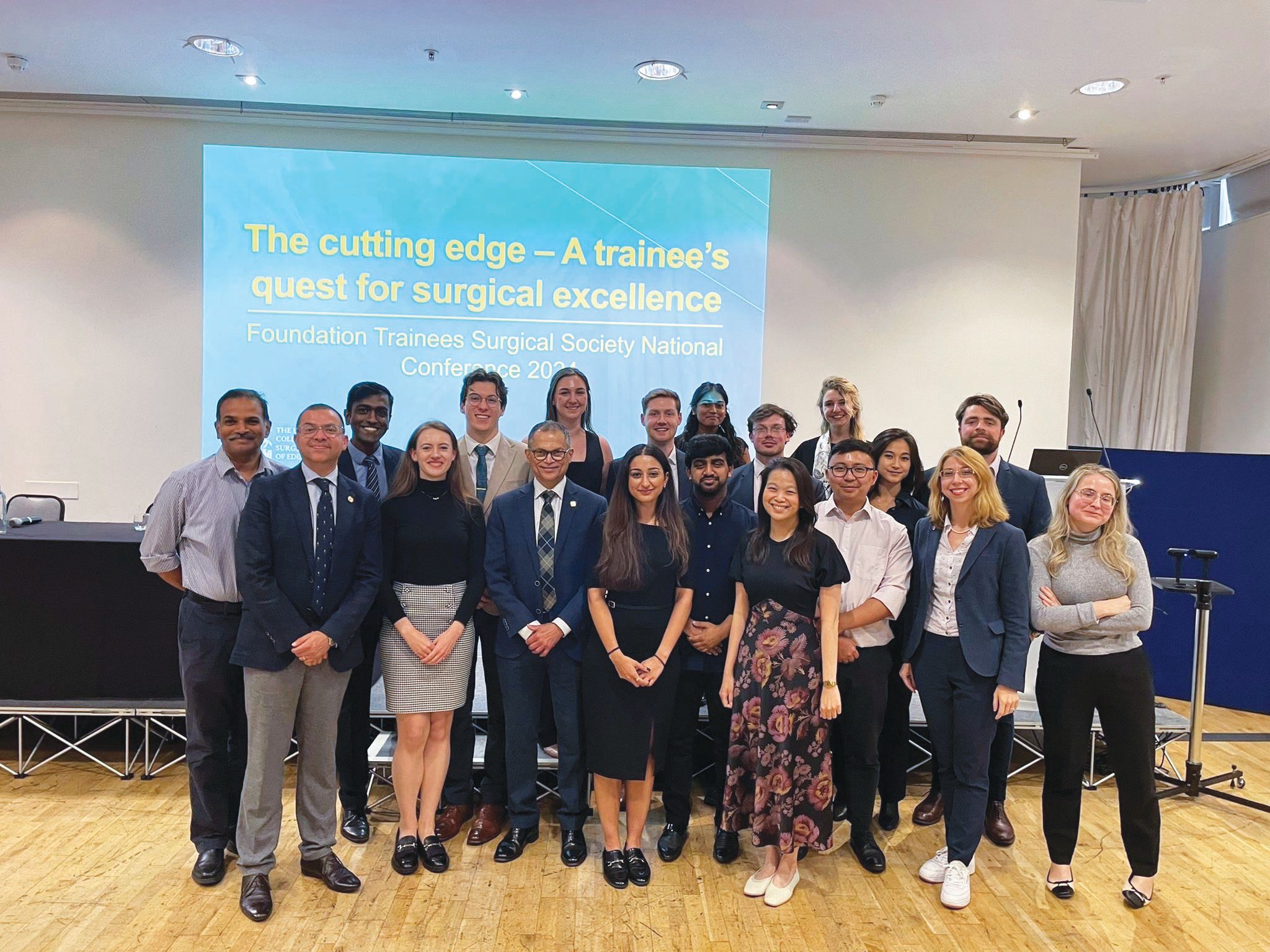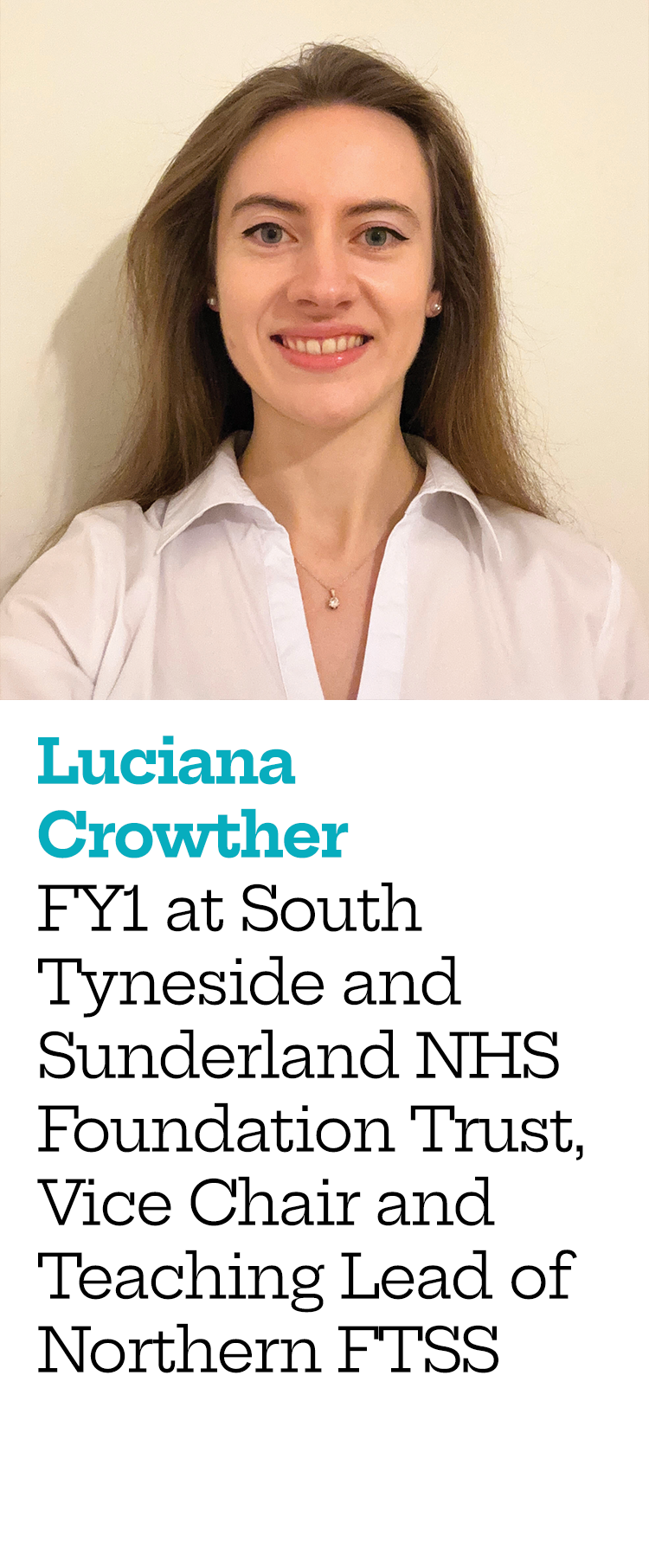The cutting edge
How the FTSS conference offers trainees surgical excellence

The word ‘horizon’ has both Greek and Latin origins, deriving from ‘landmark’ – a fitting description for the fourth National Foundation Trainee Surgical Society (FTSS) conference.
More than 160 attendees gathered at the Royal College of Surgeons of Edinburgh headquarters on 20 July 2024 for the largest iteration of the conference yet. The theme this year was: ‘Future horizons and innovation in surgery.’ Building on the success of previous conferences, the annual summit, which aims to provide inspiration, education and recognition of individuals pursuing a career in surgery, saw an unprecedented level of collaboration, with participation from 16 FTSS groups across all four nations. Since the first FTSS in Oxford in 2014, we are proud to acknowledge on its 10th anniversary the society has grown to become a national network of 16 regional FTSSs affiliated with RCSEd, which collectively form FTSS UK, officially established by the College in 2020. Each FTSS, supported by the College’s Regional Surgical Ambassadors (RSA), came together to create a conference promoting the ethos of our organisation and bring together a diverse group of like-minded foundation trainees in the quest for surgical excellence.
Late-night meetings, countless messages and a continuing chain of emails were pervaded by the enthusiasm and dedication of all involved, from the FTSS committee to speakers and the RCSEd team – a true interdisciplinary team. The organising committee was ably led by Vishnu K Sajeenth and Conor Hennessy, joint chairs of the Oxford FTSS, displaying great organisational skills. Even a global IT outage and delayed or cancelled flights could not stop us; with swift adaptations the conference was transformed into a hybrid event, bringing speakers who couldn’t attend in-person online.
This year’s conference aims were to promote the choice of surgical training, raise awareness of alternative training routes, provide an insight into surgical specialties, career choices and Less Than Full Time Training, and facilitate an environment for foundation trainees to network and present their work nationally.
THE NEXT GENERATION
A warm welcome and overview of FTSS was delivered by Mike Silva, Director of the FTSS Network and our founder, to whom we owed the pleasure of sitting within the grounds of a historic building dating back to 1832.
From established surgeon to the rise of the next generation breaking ground in the surgical field, Kiran Saini discussed the Core Surgical Training (CST) application and portfolio with methods to maximise points and efficiency like the two-day audit. This was followed by Alex Baldwin’s talk on ‘Alternative Pathways into Surgery’. He shared his experience and highlighted the importance of discipline and a determined mindset to achieve equivalent competencies, regardless of whether you are CST or not. His personal journey was a reassurance that surgical training can look different to the standard route but have the same impressive outcome.
Morning proceedings continued after a break with four specialty talks and a Q&A session. Patrick Tabet’s talk on plastic surgery pointed out the progression from forehead flaps in 600BC to the father of plastic surgery, Sir Harold Gillies, and ongoing trajectory towards digital and biological innovations, including corneal neurotization and supermicrosurgery. More than just a “hole-filling service”, our trainees heard about a specialty that could be likened to reverse engineering of the human body owing to its properties of surgical creativity, collaborative pan-specialty nature and technological incorporation.
Mei Nortley, joining via Teams, spoke about vascular surgery, similarly echoing the value of a multifaceted approach. Dispelling myths of the “fem-dismal bypass”, her recollection of an afternoon clinic was filled with heartwarming stories of patients she had operated on who attended in a cranio-caudal fashion starting superiorly with carotid endarterectomy, to a lady with severe mesenteric angina, moving progressively inferiorly to a patient with previous acute limb ischaemia.
Next, David Walker was keen to emphasise that ENT is “not just snot and wax”. His talk highlighted that surgery is not always the answer and, for patients with psychiatric presentations or those requiring physiotherapy input, knowing when not to perform surgery is just as wise.Walker’s time in Malawi and teaching in St Andrews demonstrated flexible working opportunities for those wanting a taste of the international life or somewhere closer to home.
The final specialty speaker, John Taylor, also travelled abroad in his career in emergency general surgery, taking him across the pond to the next-door laboratory of Robert Acland, of the legendary Acland’s Anatomy – a revision source familiar to many of our audience. Taylor discussed the trend towards centralisation and UK trainees having a voice powerful enough to change the shape of training.
STIFF COMPETITION
Six candidates gave oral presentations demonstrating the high-quality research and quality improvement in surgery, leaving the judging panel widely impressed. Alexandra Murray won with her presentation, entitled ‘A review of the usage, oncological safety and cosmetic outcomes of chest wall perforator flaps in partial breast reconstruction’, closely followed by runner-up Sophia Wakefield.
After lunch, activities resumed with three thematic talks. Keaton Jones spoke about ‘Robotics in Training; The Changing Landscape of Training’ and emphasised the increasing presence of robotic surgery, although its incorporation into the General Surgery Curriculum is yet to follow. Nonetheless, he was excited for this paradigm shift and gave useful advice for trainees who will be “riding the crest of the wave”.
Professor Amar Rangan was equally keen in supporting trainees and discussed the relevance of randomised control trials to develop policies, further advancing the practice and knowledge of surgery in his talk on ‘Academic surgery’.
The final thematic talk on ‘Innovation in surgery’ was delivered by the UK’s first professor of engineering in surgery, Professor Shervanthi Homer-Vanniasinkam. Her achievements are truly inspiring, with pioneering research in understanding cellular mechanisms of reperfusion injury to building casts to accommodate expansion in paediatric orthopaedics.
The power of partnerships, international relations and the ability to listen were common threads throughout the presentations.
WORK-LIFE BALANCE
The conference aimed to provide an insight into Less Than Full Time Training (LTFT) and Kiran Altaf and Isabel Martin shared their perspectives, from a supervisory role and as an LTFT trainee, respectively. With an overview of the problems facing the NHS, including retention, both speakers championed the positives of LTFT, such as improved work-life balance and productivity.
Concerns around more trainees going abroad and the pressure to achieve competencies within a set period in the move towards more streamlined training were raised. Nevertheless, maintaining a focus on training with well-protected time and being at the dawn of a new age for surgery with AI, robotics and scientific discoveries, the future looks bright!
Concluding a successful day, Mike Silva and Yusuf Michla, National FTSS Deputy Director, announced the prize winners and launch of the new RCSEd National Core Trainee Forum to support the surgeons of tomorrow.
The conference is largely organised by foundation trainees, and over the years has been influenced by the feedback we have received to facilitate a peer-led shared learning environment. We would like to express our gratitude to everyone who participated in and helped with the conference organisation, with special thanks to Gemma Spence, Una Curran, Craig Brodie and the rest of the RCSEd team. Leaving with a smile and a unicorn, we hope to see you next year!


